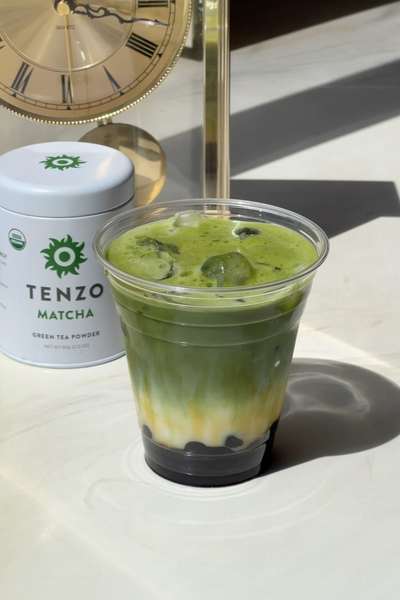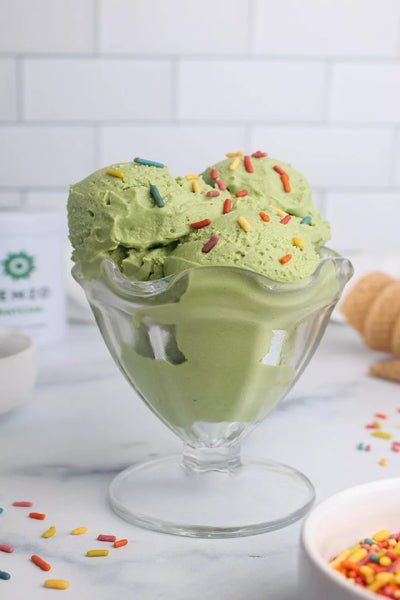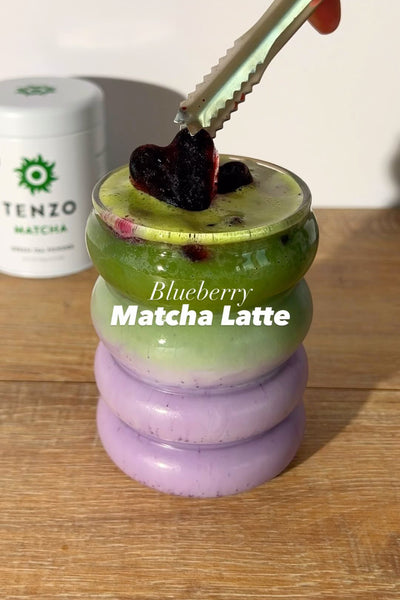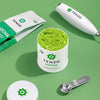Best Teas for Inflammation | Anti-Inflammatory Tea

Inflammation can be a symptom of many different types of conditions, illnesses or injuries, and it can cause discomfort, pain, or limited mobility over time. It can be acute or chronic, develop internally or externally, and may be the result of a medical condition or an injury or trauma that causes swelling.
It’s always essential to speak with your healthcare professional before diagnosing or beginning to treat inflammation at home, especially since it can indicate other potential health complications that need to be addressed. That said, there are a few simple additions to your diet that can help you to manage your inflammation at home and reduce those feelings of discomfort.
One of them is tea—and Tenzo Tea is here to help. We want to make it smooth and easy to find the right ingredients and information to help support you on every stage of your health and wellness journey. Here’s what you’ll want to know about fighting inflammation with tea.
Why is Tea Good for Inflammation?
While there are many types of medications for managing inflammation, natural options can often be just as effective without the side effects—and tea is one of those great natural options.
Tea is known for its anti-inflammatory properties, and they appear in both green and black teas. Green tea has shown to be more effective at reducing symptoms of inflammation in scientific trials than black tea is.
Tea is useful for managing inflammation on its own, but that’s not the only reason you’ll want to consider reaching for it if you’re managing symptoms of swelling. Many of the herbs and fruits used to make tea are also effective at reducing inflammation and associated symptoms, so tea can be a great homeopathic tool for many reasons.
Best Anti-Inflammatory Teas
There are so many supportive and boosting tea options to pick from when you’re looking to improve your overall health and wellness, and manage symptoms of inflammation. It can be difficult to know where to start, so here are a few of the most common and effective anti-inflammatory teas.
Ginger Tea
It’s no surprise that ginger is one of your best tea picks for managing inflammation. Ginger is well-known for its healing benefits when it comes to stomach pains and nausea, which is another great reason you’ll want to keep it in your pantry.
Ginger is incredibly rich in antioxidants and can actually help to minimize or reduce the development of what is known as cytokines, which cause inflammation in your body. Ginger has shown to be helpful in patients with conditions like diabetes and osteoarthritis.
Chamomile Tea
Not only is chamomile a delicious and relaxing tea option that can help reduce anxiety and ensure a restful night sleep, but it’s a great choice for gently managing inflammation, as well. Like ginger tea, chamomile tea contains the important compounds that are helpful for reducing inflammation and preventing it from occurring.
Getting enough sleep is also a great way to find or manage conditions that cause inflammation and chamomile is the perfect sleepy time beverage for all those late nights.
Cinnamon Tea
There are so many benefits to drinking cinnamon tea, a type of tea rich in cinnamomum, which is what gives cinnamon its iconic flavors and many of its excellent health properties. Cinnamon tea can boost heart health, fight bacterial and viral infections, and even reduce the risk of developing diabetes.
It’s also great for managing inflammation, due to its richness in spice and many antioxidants. Cinnamon has even been shown to help with tissue damage repair.
Rooibos Tea
Rooibos tea is known for boosting heart health and even reducing the risk of developing some chronic conditions and illnesses. It’s rich in many vitamins and antioxidants and has shown to be an effective anti-inflammatory for patients managing symptoms of rheumatoid arthritis. It is also helpful as an antihistamine and for reducing the appearance of aging, so if inflammation is cosmetic or develops as the result of an allergy, rooibos can be helpful for managing those effects.
Turmeric
Turmeric tea gets most of its health benefits from curcumin, which is also where it derives that bright orange coloring from. Not only can it support inflammation relief, but it has actually proven effective at reducing the pain from inflammation, as well. Turmeric has been tested for inflammatory conditions like rheumatoid arthritis and osteoarthritis, and patients have reported an improvement in discomfort and a reduction of inflammation after regular use.
Green Tea
There are so many reasons to love green tea—including all of its associated health benefits. Green tea is rich in vitamins and antioxidants and it can work to boost your immune system. Green tea is also an excellent option for getting better rest, reducing your anxiety and levels of stress and, of course, managing inflammation resulting from chronic conditions or acute illnesses.
Why is Matcha Tea One of the Best Anti-Inflammatory Teas?
Matcha green tea is a type of green tea that takes all those excellent benefits to the next level—and you can begin trying it out for yourself with a trial kit today.
Here are a few reasons that matcha tea is the anti-inflammatory tea you’ll want to turn to first.
It’s Rich in Vitamins and Antioxidants
Matcha tea is prepared differently from traditional teas, in that it is mixed in, rather than steeped. That means it maintains more of its nutritional benefits and many of the great antioxidants and vitamins that can help you to feel good and fight inflammatory conditions.
It Contains the Catechin EGCG
EGCG is a type of catechin, or plant-based compound, and it’s excellent for fighting symptoms and signs of inflammation, swelling, and redness. In fact, it’s most known for its contribution to the health and wellness effects of green teas, including matcha. Not only can it reduce symptoms of inflammation, but it has also been known to help manage or reduce the risk of developing more extreme health conditions that can often lead to inflammation.
It Can Boost Your Immune System
Inflammation is often just the symptom of a larger illness or health condition. Thanks to its many antioxidants and nutrients, matcha is known for boosting the immune system and helping your body to fight off infections—including ones that can lead to inflammation.
Other Benefits of Matcha Tea
Those aren’t the only reasons you’ll want to make matcha tea a part of your routine. Here are just a few of the other benefits to regularly drinking matcha tea.
Caffeine Without the Crash: Matcha provides a lot of the same energy-boosting benefits as drinks like coffee, but without the uncomfortable side effects like caffeine crashes, headaches, and acid reflux.
Longer Lasting Energy: Because matcha is more gentle than other caffeinated beverages, its effects last longer and help you to stay energized and focused for the whole day.
Alertness Without Anxiousness: A lot of caffeinated beverages can cause jitteriness or anxiety, but matcha isn’t one of them. It still provides an energy boost, but you won’t have to worry about feeling hyper or stressed afterwards, since matcha is often used for meditation, yoga, and as a stress reliever.
Mouth Healthy: Matcha has been known to reduce the risk of developing cavities and conditions like periodontal disease, which is a type of inflammation of the gums. There are many reasons to consider drinking green tea before bed, and oral health is one of them.
In Summary
Inflammation can occur for many reasons and can impact your body and overall wellness in many ways. It’s essential to remain in communication with your healthcare professional when managing inflammation, but you’ll also want to consider non-medicinal management options that are often gentler and come with fewer side effects.
One of those options is tea, which is known for helping to reduce inflammation, boost the body’s immune system, and provide essential vitamins and antioxidants that can help relieve pain and inflammation and improve your overall wellness.
Tenzo Tea is here to help. We believe everyone deserves access to the ingredients and resources that are best for their body, like matcha tea, a type of green tea that can provide gentle energy boosts without extreme side effects. And, of course, it’s a great choice for managing symptoms of inflammation. It also provides other health benefits, like reduced feelings of anxiety compared to other caffeine sources and keeping cavities at bay.
Explore your options and begin managing inflammation with tea at home today!
Sources:
https://www.ncbi.nlm.nih.gov/books/NBK279298/
https://www.healthline.com/nutrition/anti-inflammatory-tea
https://www.healthline.com/nutrition/egcg-epigallocatechin-gallate










